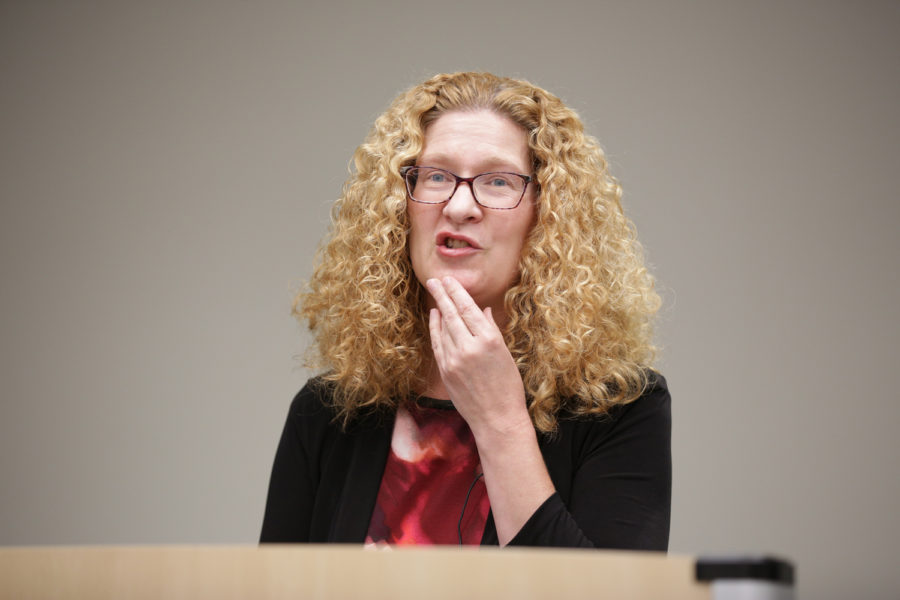Pitt Law hosts Constitution Day panel
Thomas Yang | Assistant Visual Editor
Associate Dean for research and faculty development Deborah Brake discusses gender and its relation to the 14th Amendment at a Constitution Day panel held in Barco Law Building on Monday.
September 18, 2018
The bitterly contested 14th Amendment to the U.S. Constitution was adopted in 1868 to address citizenship rights for former slaves — and 150 years later, some Pitt law professors think it’s still not totally effective.
In honor of Constitution Day on Monday, the University of Pittsburgh School of Law hosted a panel discussion about the promise, limits and ongoing challenges in realizing the rights guaranteed by the 14th Amendment.
Around 50 students, staff, faculty and community members attended the event, which featured topic discussions by associate law professor Jasmine Gonzales Rose, law professor David Harris and Associate Dean for research and faculty development and law professor Deborah Brake.
Brake organized the event to discuss the promise, limits and ongoing challenges for realizing the rights guaranteed by the 14th Amendment. She began her discussion by examining the first section of the amendment, which states that “no State shall make or enforce any law” that should deprive people of their rights as citizens — meaning all citizens born in the United States are automatically citizens of the country and their state.
“The 14th Amendment has been such a tremendous source of individual rights. There are a lot of other places in the Constitution that grant individual rights … the Bill of Rights only runs against the federal government,” Brake said. “So, without the 14th Amendment, it just would be a very different country in terms of an individual’s ability to assert rights against government power.”
Rose, the first speaker, began the lecture by discussing the amendment’s effectiveness in ensuring equality. She examined it in the context of jury selection, talking about a case in Connecticut where a non-native English speaker was not selected because of worries he would not be understood by other jurors.
“It is well-settled that he can’t be excluded based on appearance, but it was based on sound. Our understanding of what race is is narrowly defined. Accent is an external marker of race,” Rose said.
Brake took her spot at the podium next, examining the amendment in relation to gender.
While the introduction of the talk began with a reading of the first clause of the amendment, Brake focused on the second section — which marks the first and only time that rights in the Constitution were exclusively set aside for men, guaranteeing only that men would have the right to vote.
Brake said that the future success of the 14th Amendment would not be measured by any court, but instead by how society addresses the rights of all people regardless of gender.
“Where we go from here with a newly comprised Supreme Court remains to be seen, but in the long arc of history, the fate of this amendment’s promise will not be determined by any one court, not even the Supreme Court,” Brake said. “The constitutional promise of equality as it relates to gender will continue to be the source of rights claimed by women and other gender-oppressed groups.”
Harris was critical of some of the limitations of the amendment that still exist for certain citizens, not based upon gender or race, but dependent on which state they live in. He was particularly critical of Pennsylvania’s inability to provide quality attorneys for all defendants in court.
“You are sitting right now in the only state in the Union that gives no money from the state level to indigent defense,” Harris said. “We are in a club of one. So [in] Allegheny County and Philadelphia, you might have a decent indigent defense allocation, but you go a couple of counties over, and you might not have much.”
Rob Wible, director of academic success and bar exam services at Pitt Law, said he loves any chance to hear speakers at these sorts of events because it relates so closely to his work.
“It’s an incredible experience to get to hear them and the level of understanding that they have about the 14th Amendment and generally the Constitution, but specifically with the topics here today,” Wible said.
Peter Campbell, an English professor at Pitt who studies legal rhetoric with a focus on the 14th Amendment, also came to the event because it relates to research he’s currently conducting.
“I really appreciated the emphasis on advocacy, so the need for people entering the legal profession to focus on organizing and striving for the realization of rights promised in the Constitution, and also for the need to take the Constitution as an inspiration to seek justice — not only inside, but outside of the legal system,” Campbell said.







